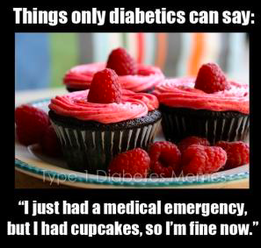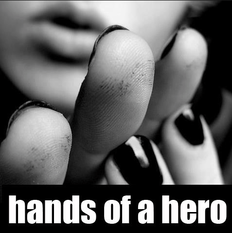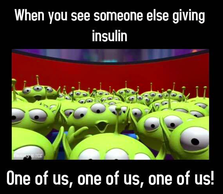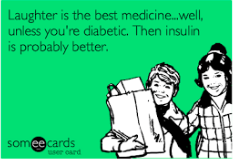
On January 14, 2016 my husband and I decided to check our son’s blood sugar with his sister’s meter. He tested HIGH (500+) and his ketones were HIGH. We called the doctor and were told to go to the ER. The doctor confirmed the diagnosis and the family wept.
I would have thought the second time around would have been easier. I was wrong. When our daughter was diagnosed it was all so new. We didn’t know about the battles ahead of us, and were overwhelmed with all the new learning: carb counting, insulin dosage, changing dosage, hypoglycemia, hyperglycemia, comas, and ketoacidosis. With our son, we “knew” the drill and what his life, too, would forever be like.
I ugly cried like I never ugly cried before. He’s my baby. So little, so cute, so funny, so charming. What will this life-long disease do to him? Will it suck the life out him like it has my daughter? He’s been the glue holding our family together. I can’t lose him to this disease as well.

When you have to tell your child he can’t go down the road to hang out at the neighbor’s house because they aren’t trained to administer his shots.
When your son’s blood sugar is 95 and goes off to play with his buddies only to come back 10 minutes later because he’s shaking and sweating and weak and find out his blood sugar dropped to 39 for no other reason than he has diabetes and it can’t be controlled by a clock or a plan.
When your daughter wants to go to a friend’s house but you don’t trust the parents to follow through with the diabetic care.
When you’re out and about and run out of fruit snacks (the fast acting carb of choice by your children) and have to buy a soda and tell your child to chug it, only to receive stares from parents who are probably questioning your parenting skills…and not caring one bit.

When your daughter hears a joke about diabetes at school from kids who don’t know better and she wants to punch them in the face or go ape $#1+ on them and you have to tell her to behave respectfully, and educate those around her (when you feel like punching people in the face as well).
When your family goes to a family friendly movie and the characters make a joke about diabetes and everyone in the theater laughs and your children feel insulted.
When people offer special recipes or beverage mixes that will control blood sugar. When in reality these things have NO impact on a type 1 diabetic.

When one child enters carbs into her pump and the other has to do shots for every morsel eaten because he’s not approved for the pump yet.
When people ask if your child can have a cupcake. YES!! And she has to have as much insulin for a cupcake as she does that giant apple you’re offering her instead.
When you’re at a party and everyone is ready to eat but your child checks his blood sugar and its 350 and he needs to wait 30 minutes before eating but everyone else has started. And you feel bad and tell your child to eat anyway, knowing it’s not good for him.
When your daughter throws a fit and says she wants to be just like everyone else and eat a handful of pretzels without pausing to test her finger and give herself insulin.

When your son puts on his hat and gloves and snow pants and snow boots and winter coat to go outside to play only to come back in five minutes later because he feels low and has to sit on the couch and watch his friends play while he waits for his blood sugar to come back to normal range.
When you have to wake up all the children and go to the ER that’s an hour away instead of the hospital that’s 20 minutes away, because they have the best diabetes care—twice in one week. For two different kids. Both diabetes related.
When my child throws up and I don’t know if she’s sick with the flu or if it’s from complications from diabetes and have to call the doctor and rush to the emergency room.

When my needle-phobic 9 year old son no longer screams when he has blood drawn and IVs inserted because it’s old hat now.
When you can’t rush out the door to go anywhere because you have to check both children’s diabetes bags—who are on different meters, insulin and needles—to make sure they have back up insulin, needles, test strips, fast acting carbs and the dreaded glucagon shot. Even if we’re only going on a quick five-minute trip to the grocery store.

When people kindly say they hope my children feel better. They feel fine. It’s not a sickness, but a disease that no pill, no exercise and no diet can make go away. It’s a life sentence that they must learn to live with.
When people say say God wouldn’t put this on our plate if He didn’t think we could handle it and I think God has made his first mistake.
When you have seven different alarm times preset on your phone and get up multiple times in the night to test your child’s blood sugar, or go check on him or her to see if they are still alive and haven’t gone into a diabetic coma while they are sleeping.

I hate that my children’s normal is nothing like their friends’ normal.
I hate that my newly diagnosed son’s numbers are so wacky that every week he is pricking his finger at least 84 times and has had 49+ injections.
I hate that even though my daughter has had diabetes for 7 ½ years and is on the pump, she is embarrassed to have a device stuck to her body 24/7.
I hate not being able to kiss a boo-boo and make things all better.
I hate this disease.
But I am thankful.
Thankful for my diabetes support groups. For the amazing team of teachers and nurses at my children’s schools. For our friends who are a constant sounding board. For my children’s friends who love them and care about them unconditionally. For a loving husband who tends to the kids and lets me hide in our room and cry when I need to.
I am thankful for my children’s health. They don’t often get sick with colds or flus or stomach bugs. Their immune systems are healthy and strong; they’re active in sports and can do anything their heart’s desires. My son may not be able to go into active combat in the military, but there are other options for him. He’s only nine and already researching “cool army jobs for diabetics”.
I am thankful my children are alive and that I can love them and cuddle with them and smile and laugh with them every single day.
For more information about diabetes, visit the ADA and JDRF websites:
http://www.diabetes.org/diabetes-basics/type-1/?referrer=https://www.google.com/
https://www2.jdrf.org/site/SPageServer/?pagename=walk_homepage

















































 RSS Feed
RSS Feed


